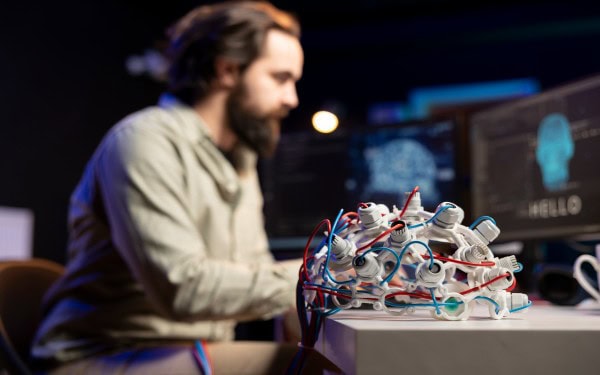Dr. Christian Beste’s groundbreaking work in psychological neuroscience integrates psychological and neurobiological approaches to investigate action control and its modulation by developmental and neurobiological factors.
This article delves into the fascinating field of psychological neuroscience, showcasing the pioneering work of Dr. Christian Beste. By integrating psychological and neurobiological approaches, His research provides deep insights into the mechanisms of human cognition and action, and how they are modulated by developmental and neurobiological factors. The article highlights the practical applications of psychological neuroscience in clinical practice and its potential to revolutionise our understanding of the brain and behaviour.
Dr. Christian Beste, a leading figure in the field of psychological neuroscience, has made significant contributions to our understanding of human cognition and action, and their modulation by various factors. His innovative approach, which integrates psychological and neurobiological perspectives, has yielded profound insights into the complex interplay between the brain, cognition, and action. This article explores the groundbreaking work of the neuroscientist and the practical implications of psychological neuroscience in clinical settings, offering a glimpse into the future of this exciting field.
The Emergence of Psychological Neuroscience and Dr. Christian Beste’s Contributions
Psychological neuroscience is a rapidly growing field that bridges the gap between psychology and neurobiology. This interdisciplinary approach seeks to understand the neural basis of human cognition, action, and emotion by integrating insights from both disciplines. The emergence of psychological neuroscience has been driven by advances in neuroimaging techniques, such as functional magnetic resonance imaging (fMRI) and electroencephalography (EEG), which have enabled researchers to study the brain in unprecedented detail.
Dr. Christian Beste, a pioneer in the field of psychological neuroscience, has been at the forefront of this exciting development. His research focuses on the neurophysiology of action control, a crucial aspect that involves the selection, initiation, and execution of actions in response to internal goals and external stimuli. By combining psychological theories with cutting-edge neurobiological methods, the neuroscientist has shed new light on the complex mechanisms underlying action control and its modulation by various factors.
Integrating Psychological and Neurobiological Approaches
One of the key strengths of Dr. Beste’s research is his ability to integrate psychological and neurobiological approaches seamlessly. This integration allows for a more comprehensive understanding of human cognition and action, as it takes into account both the subjective experiences and the underlying neural processes.
In his studies, the neuroscientist employs a range of psychological paradigms, such as the stop-signal task and the flanker task, to measure cognitive performance and processes. These tasks are designed to assess specific aspects of cognition and action, such as response inhibition and cognitive flexibility. By combining these measures with neuroimaging and electrophysiological techniques, the neuroscientist can identify the neural correlates of cognition and action, and how they are modulated by various factors.
Developmental and Neurobiological Factors in Cognition and Action
One of the key areas of Dr. Beste’s research is the investigation of how developmental and neurobiological factors influence human cognition and action. This line of inquiry is particularly relevant for understanding the emergence of cognitive control during development and its potential disruption in various neurological and psychiatric disorders.
Developmental Trajectory of Cognitive Control
Dr. Beste’s research has shed light on the developmental trajectory of cognitive control, revealing how this crucial function matures throughout childhood and adolescence. By studying the brain activity of individuals at different ages using EEG and fMRI, the neuroscientist has identified the neural networks and processes that underlie the development of cognitive control. His findings suggest that the prefrontal cortex, a region of the brain involved in higher-order cognitive functions, plays a critical role in the maturation of cognitive control.
Neurobiological Factors and Disorders
In addition to developmental factors, Dr. Christian Beste has also investigated how various neurobiological factors and disorders can modulate cognition and action. His research has focused on a range of conditions, including:
- Attention deficit hyperactivity disorder (ADHD)
- Obsessive-compulsive disorder (OCD)
- Tourette syndrome
- Parkinson’s disease
By studying the neural mechanisms underlying cognition and action in these disorders, the neuroscientist has provided valuable insights into the pathophysiology of these conditions and potential targets for intervention. For example, his research on ADHD has revealed that individuals with this disorder exhibit altered patterns of brain activity during tasks that require action control, suggesting that targeting these neural processes could be a promising approach for treatment.
Practical Applications in Clinical Practice
The insights gained from Dr. Beste’s research in psychological neuroscience have significant implications for clinical practice. By understanding the neural basis of human cognition and action, and their modulation by various factors, clinicians can develop more targeted and effective interventions for individuals with neurological and psychiatric disorders.
Informing Diagnosis and Treatment
One of the key applications of psychological neuroscience in clinical practice is informing diagnosis and treatment. By identifying the specific neural processes and networks involved in cognition and action, researchers like Dr. Christian Beste can provide clinicians with objective markers for assessing cognitive function and monitoring treatment response. This approach has the potential to revolutionise the way we diagnose and treat disorders characterised by impairments in cognitive control, such as ADHD and OCD.
Developing Novel Interventions
Another important application of psychological neuroscience is the development of novel interventions that target the neural mechanisms underlying cognition and action. Dr. Christian Beste’s research has paved the way for innovative approaches, such as neurofeedback training and transcranial magnetic stimulation (TMS), which aim to modulate brain activity in specific regions and networks involved in cognitive control. These interventions have shown promise in improving cognitive function and reducing symptoms in individuals with various disorders.
Conclusion
The field of psychological neuroscience, as exemplified by the groundbreaking work of Dr. Christian Beste, holds immense promise for advancing our understanding of human cognition and action. By integrating psychological and neurobiological approaches, researchers like Dr. Beste are providing deep insights into the complex mechanisms underlying cognition and action, and their modulation by developmental and neurobiological factors.
The practical applications of psychological neuroscience in clinical practice are vast, ranging from informing diagnosis and treatment to developing novel interventions. As this exciting field continues to evolve, it has the potential to revolutionise the way we approach neurological and psychiatric disorders, ultimately improving the lives of countless individuals affected by these conditions.
Dr. Christian Beste’s pioneering research serves as an inspiration for the next generation of psychological neuroscientists, highlighting the importance of interdisciplinary collaboration and the pursuit of innovative approaches to understanding the brain, cognition, and action. As we look to the future, the insights gained from psychological neuroscience will undoubtedly shape the landscape of clinical practice and pave the way for groundbreaking discoveries in the years to come.







